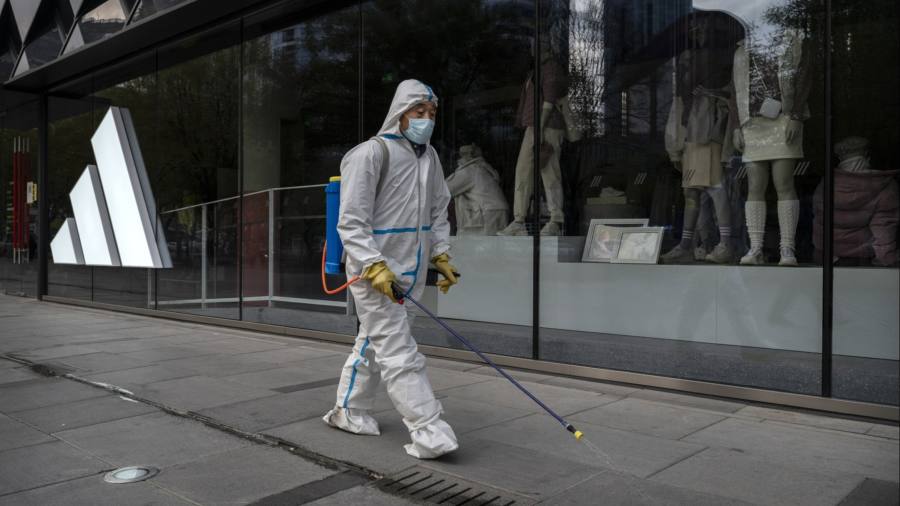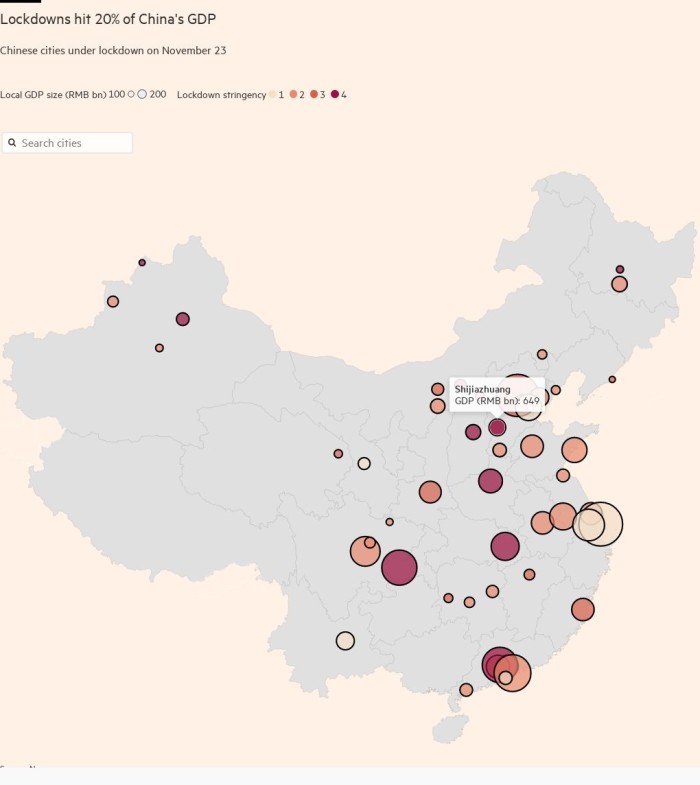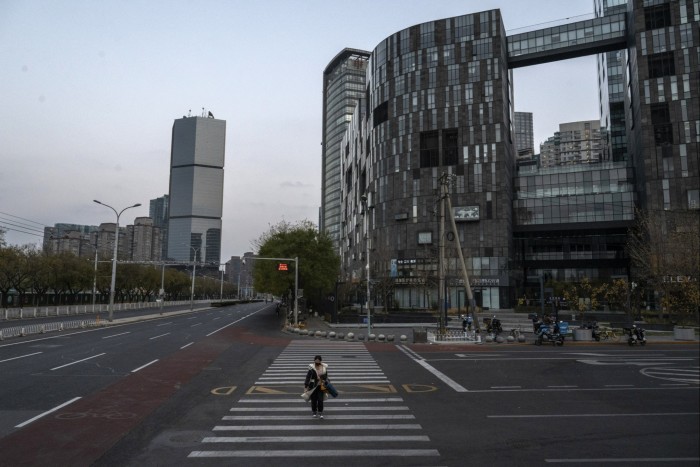
Days after the northern Chinese city of Shijiazhuang reopened, barista Lu Mengyuan donned her apron, applied her eye glitter and was again whipping up coffee and hot Chinese crepes for the trickle of residents venturing slowly from their homes.
Like many others, Lu believed the city’s abrupt reopening in the middle of a Covid-19 wave and its vow to do away with mass testing marked a turning point. “We’re the first in China, an experiment,” she said last Wednesday. “We will not lock back up.”
This week, however, Lu was again isolated and her silver Airstream coffee truck closed. “I really have egg on my face,” she said.
Rising Covid cases have forced officials across the country to backpedal from some of the tamer zero-Covid policies pushed by Beijing less than two weeks ago. Analysts and investors had hoped the measures announced by China’s cabinet on November 11 would mark the start of a shift to living with the virus.
Instead, the looser policies and confusing signals from Beijing have stoked a growing Covid outbreak, with new cases across the country nearing a record 30,000 per day. Swaths of the population have once again been locked down in an effort to cut transmission.
“Some local governments were confused, but the central government has now made the signal clear: China is not giving up containment for now,” said Ernan Cui, an analyst at research group Gavekal.
“Tightening Covid controls in areas with outbreaks seems their only option. The economy may suffer more pressure as the government buys time to prepare to live with Covid.”
In the Chinese capital, life has slowed down, with the largest district, Chaoyang, mostly shut. Residents in the southwestern metropolis of Chongqing are trapped at home, while an outbreak in Zhengzhou near a huge factory spitting out Apple’s iPhones is festering. Lockdowns in the southern manufacturing hub of Guangzhou have expanded, too.
“The costs are becoming more and more unbearable. It’s frustrating,” said William, a ride-hailing driver trapped in Guangzhou’s Haizhu district. He added that the area’s initial three-day lockdown had already been extended four times.

The impact of China’s recurring Covid outbreaks and lockdowns is not confined to its borders. Slackening demand has dented sales for global companies such as Nike, helped contain oil prices and battered global supply chains.
Goldman Sachs has forecast that gross domestic product will grow 3 per cent this year and 4.5 per cent in 2023. China’s official target is 5.5 per cent growth this year. Any reopening would probably be “messy and bumpy” in the initial stages, Goldman said.
The latest policy U-turn on zero-Covid had a big impact on Shijiazhuang, which lurched from empty to bustling to empty again in the space of nine days. Its decision last week to do away with mass testing and reopen put the city on track to start living with Covid.
“We wanted to do what the people were calling for. We wanted to open up, but then we did and everyone was scared,” said an official at the city’s Center for Disease Control and Prevention. “The changes have been fast. We’ve totally confused residents.”

The official added: “The government faces a dilemma. China’s economy has turned into what it is now. It’s not good . . . [but] if we fully open up, hospitals will be overrun, not only with Covid cases but also the other underlying disease it brings out. It’ll take a lot of medical resources. We’ll be overwhelmed.”
Analysts said China needed to increase elderly vaccinations and prepare the healthcare system to minimise deaths in any reopening. Just 66 per cent of people over 80 have received two Covid jabs.
Shijiazhuang is the provincial capital of Hebei and also one of China’s poorest cities with a population of 11mn. Covid lockdowns in September and again in early November had already taken a toll on businesses, said the owner of a phone retailer. “Many didn’t make it,” he said.
City budget documents blame falling land sales and rising outlays for essentials such as pandemic prevention for its 25 per cent year-on-year decline in income and 29 per cent increase in spending. It has left an “unprecedented gap between income and expenses,” the city’s deputy head of finance, Zhou Qiao’e, warned in August.
Local governments across the country face similar challenges as lockdowns and a collapsing real estate market dent revenues while spending on Covid testing and prevention soars. Economists at Nomura estimate 412mn Chinese residents face some sort of pandemic restriction or lockdown.
“The leadership has consensus that they need to avoid Shanghai-style lockdowns, but the problem is what kind of balance [between containment and opening] they can achieve,” said Ting Lu, Nomura’s chief China economist, referring to the financial hub’s two-month lockdown this year.
“In the near term, they may settle on a new balance which might still be quite restrictive given the surging Covid cases.”
Ambulance driver Xue Zhikun was thrown into the middle of Shijiazhuang’s policy debate last week. Demand for his services hauling potential Covid cases to the city’s quarantine hotels fell. “I only brought in six people this morning,” he said last Wednesday as he pulled off his respirator and white protective suit outside a quarantine hotel.
This week, business picked up for Xue after the government renewed mass testing — until he tested positive himself. In his protective gear, Xue drove his ambulance to the most luxurious quarantine hotel he knew to check himself in. “I have a fever and headache,” he said. “The virus gets through any holes.”
Noting the size of the latest outbreak, Cui at Gavekal said the “chances that Covid containment fails are now higher than ever”.
Additional reporting by Nian Liu in Beijing